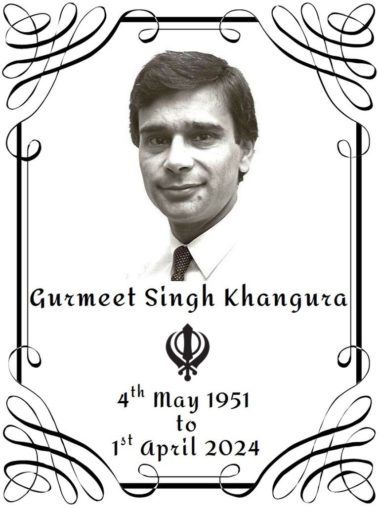
Now and again, amidst the bustle of comments that none of us read, we notice that a familiar voice has fallen silent, and we wonder.
It isn’t particularly unusual for the folk who frequent this place, and with whom we’ve grown at ease, to take a little time out from the overwhelming craziness of daily events. But sometimes we aren’t quite reassured by that thought and a shadow of unease creeps in. Maybe we enquire of one another, ‘has anyone seen…?’ and we hope that they are OK.
Some of us merry band of Puffins are in contact outside of this place. Maybe we have met in person, or we simply stay in touch (on a regular basis or sporadically through an occasional email or phone call) because we share an interest or warm to one another through expressing shared experiences. In truth, I feel this to be a very positive and human thing to do, as all of us benefit from the genial touch of friendship.
So it was that, after about a month of not seeing one our friends here, when others noticed his absence too, I sent an email. Just a brief ‘how are things’ note winged its way to our compatriot, Sikh Warrior. A reply duly came, but not from Gurmeet, our Sikhy.
It came from his son, who gently told me that our dear friend had passed away at the beginning of April. I need not say how sad this made me, and it pains me to be the one to impart distressing news.
Though Sikhy no longer flies alongside us, he will never be forgotten. He touched so many of our souls over the years. A much-loved, well-respected friend, I’m sure that he has already found a comfortable hobbit-like burrow with the other Puffin pals who have gone before us. I can almost see him there, with a glass of his favourite rum beside him, busily sketching the magnificent nature he sees around him, just itching to share his drawings with us when our time comes.
With his family’s kind permission, I wanted to say a few words about the man I came to regard as a friend. Though it sounds odd, I actually knew very little of his life. He always remained a very private person in our correspondence, indeed often more concerned with offering a supporting voice to me than opening up about his life. He did, however, offer some of himself in an article written in 2019 for this community, titled Midlife and the search for the ‘Wild Man’.
Rather regrettably, I missed this insight at the time as it was published on my birthday (how spooky is that!) which we were celebrating by swanning around Eastern Europe by train. But reading it now, it is easy to see the fit with the Sikhy I came to know – thoughtful, widely read, reflective, and smart as a whip, yet a somewhat troubled soul.
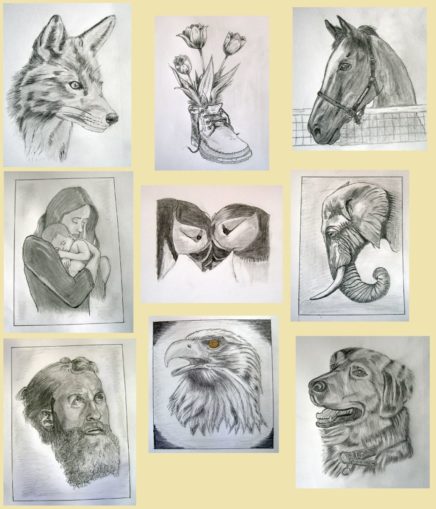
A talented artist (see a selection of his work above), he was a spiritual individual, with a deep love of the natural world. He held a firm belief in a higher power and the existence of good which can overcome evil. A kind, big-hearted man who cared about his fellow man and was always supportive of others, especially those he saw struggling, whilst downplaying any challenges he himself faced with an unruffled self-deprecation. Quite an introverted man (he’d say shy), he possessed a wicked sense of humour, but was always compassionate. A gentle person, but an innately honourable man with a keen sense of justice who had no hesitation calling out behaviour he saw as unreasonable or unfair, whether here on GP or in the wider world.
This, then, was the man I knew, but in talking to Gurmeet’s son, I came to realise that there was more, much more, to him than this. Very generously, he and Gurmeet’s former wife, Ann, have told me a bit more about his life. They are happy for me to share this with you all, to paint you a picture of a remarkable man who will be greatly missed.
On the 4th of May 1951, in Nairobi, Kenya, a son was born to Sikh parents who’d travelled to East Africa from Punjab in northwestern India. The minutiae of his parents’ story is something I know nothing about, but there is a lengthy history of Sikhs in East Africa, a phenomenon which started in the 1890’s and made a huge contribution to that region.
The new baby boy was Gurmeet Singh Khangura. Though born in Nairobi, the ‘Green City in the Sun’, soon afterwards Gurmeet, whose name means ‘companion of the Guru’, moved to Kitale in Western Kenya, where he and his three siblings were raised. There he remained until he was approaching adulthood. A photograph of the young Sikhy shows a bright, thoughtful lad, smartly turned-out in his school uniform.
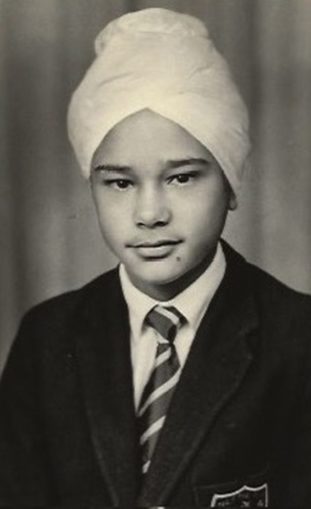
In 1968, aged just seventeen, Gurmeet left all that was familiar in Nairobi and travelled to the UK. He came alone, knowing no-one. All he had was the address of a Sikh family, who kindly took him in. Why? Well, a motivated, determined lad, his plan at this stage was to get onto an apprenticeship scheme with Yeovil-based Westland Helicopters, with the eventual aim of becoming an Aeronautical Engineer.
This sadly didn’t materialise though, as circumstances meant that Gurmeet felt compelled to earn sufficient to allow his parents and siblings to flee Kenya to join him in England.
At that time, with the new ‘Africanisation’ policies introduced by Jomo Kenyatta’s government to replace Asian-owned businesses with African-owned concerns, an increasing exodus of Asians from Kenya was underway. People who had made a significant contribution to Keyna’s economy were now facing draconian new laws which seemed designed to prevent them making a living. Unless individuals held Kenyan citizenship, for which the majority of Kenyan Asians had not applied, life became increasingly difficult. Work permits were no longer issued to non-nationals, and existing permits became non-renewable.
This is no place to go into the politics of the day, in Kenya or in Britain. Suffice it to say that his family was a responsibility Gurmeet took very seriously, so he took on work which would ensure he could help them. Setting aside his aeronautical engineering dreams must have dealt quite a blow to an ambitious young man, but the fact that he made this his priority says a great deal about him. On a more cheerful note, though, it was around this time that Gurmeet met a young woman who would become an especially important part of his life. This was Ann, his future wife.
So, with an apprenticeship on the back burner, what did our Sikhy do to support himself and his family? An active socialist at this early stage of his life, he remained in London and found a job writing for the newspaper Keep Left, the youth paper for Young Socialists.
Surprising? Maybe. But as we are aware from comments here over the years, his perspective shifted through his life, as it has for so many of us, gradually becoming more conservative.
An example of his writing in Keep Left, published during this phase, is an interview with a supposed member of the far-left terrorist group, ‘The Stoke Newington 8’, part of the Angry Brigade. It can be found here, and makes for remarkably interesting reading even now, over fifty years on.
Whatever your opinion of his views at that time, writing under the pseudonym ‘Gary Gurmeet’ he was highly successful in his role. His achievements not only meant that his parents and siblings could join him in Britain after a mere four years, but he went on to become the paper’s editor.
By 1974 it was time for a new direction. Gurmeet secured a position as a trainee journalist with King and Hutchings, part of the Westminster Press newspaper group, who published a stable of local and county newspapers. The local newspaper business was, at that time, seen as providing the best possible training a reporter could have, this being when journalists honed their craft on the job, well before the days of journalism degrees.
But ‘74 was a year of change for Gurmeet in more ways than one, as it was also the year when he married his Ann. Their first child, a son, was born a year later, in 1975.
One of the papers Sikhy wrote for was the paid-for weekly, the Acton Gazette. His UKPCA Press Card from that period shows a handsome young journalist, one whose ‘satiable curiosity is evident in his eyes.
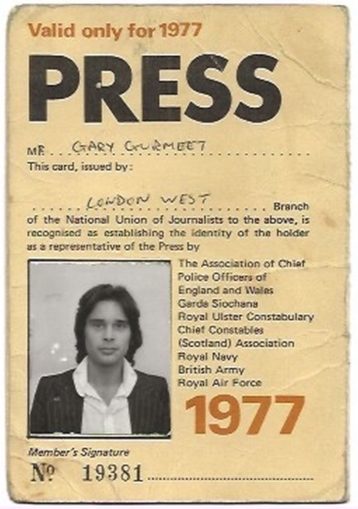
During his early days with the Westminster Press, he benefitted from the guidance of Nick Herbert (later Lord Hemingford), who had taken on the role of editorial director for the group in the year Gurmeet joined them. Herbert was well known as a ‘kingmaker’ who, during the 1970s and 80s, appointed a variety of high-profile editors at regional newspapers. Our Sikhy’s talents were certainly recognised by Westminster Press as in 1978, at the age of only twenty-seven, he was appointed the editor for the Acton Gazette. From this point onwards he continued his rise through the ranks in newspaper circles, successes secured in an extremely competitive environment.
In 1980, Gurmeet and Ann had their second child, a daughter. Unfortunately, their little girl wasn’t destined to survive. Tragically, they lost her just five days after her birth. Happily, in 1982, their second son was born. As I’ve mentioned, family was enormously important to Gurmeet. Throughout his life he good-naturedly supported his parents and siblings (who describe him as the best son/brother anyone could ask for), in addition to his own young family.
Sikhy’s life wasn’t entirely hard work and no play. Despite his work being very demanding, leaving precious little time for Gurmeet to satisfy his own wants and needs, he was a keenly competitive sportsman. Thus, he carved out a little space in which to play hockey and cricket. He also encouraged his sons to be actively involved in sports. Occasionally, he even took a moment to relax in the natural environment he loved. I’d like to think that, in this lovely photograph, he might have been watching his young boys happily playing in the park.
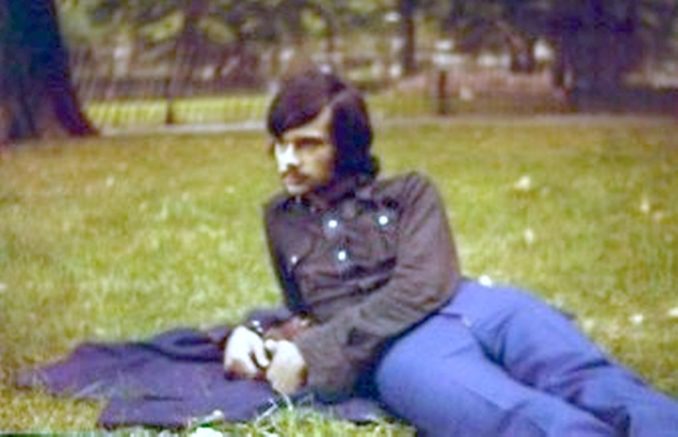
The eighties ushered in a period of upheaval and opportunities. In 1986, Westminster Press was bought out by a newly formed company, Southnews PLC, so change was inevitable. Nothing daunted, Gurmeet continued to climb within the organisation, first becoming a Director and, finally, the company’s MD in the 1990s.
Southnews was no insignificant enterprise. By 1997 the company produced around thirty-five high quality newspapers across London and the South East of England, and this rose to eighty-four paid-for and free publications by 2000, making it the tenth largest regional publisher in the UK.
So impressive was this publication base that Trinity Mirror, the biggest local newspaper publisher in the UK, acquired Southnews in 2000 for the princely sum of £285 million. Trinity Mirror was ever keen to expand further and, of course, take advantage of lucrative territory for advertisers.
At this point in time, a subsidiary of Southnews PLC, one which Gurmeet had founded and ran, was the Ethnic Media Group (EMG). In 2002, Trinity Mirror agreed to sell EMG in a management buyout led by its chairman, Gurmeet, for £10.25 million. To quote him at the time: “EMG is a very niche business targeted at a minority community and I felt it was probably going to grow quicker if it was an independent company and had the flexibility to be more entrepreneurial. We are looking to grow through the acquisition of other small businesses and also to make some new launches.”
His strategy, it would seem, was a successful one. EMG went on to become the largest minority ethnic newspaper organisation in the UK. It was the most important publisher of weekly newspapers, and magazines (and, later, websites and digital newspapers) for Britain’s African, Caribbean, Black British and Asian communities. EMG publications included Eastern Eye, Asian Times, New Nation, and Caribbean Times, amongst others.
The time and energy he devoted to his working life had put a strain on his personal life though, and in 2000, after twenty-six years of marriage, Ann finally divorced Gurmeet. Neither remarried, but they remained friends, supporting each other if needed. Their relationship lasted fifty-five years, until his untimely passing. It’s believed that Ann was the last person to see him alive.
For the last few years of his life, Gurmeet led a life of relative solitude. He took pleasure in his art and enjoyed interacting with online friends here at Going Postal. Looking back over Gurmeet’s life and numerous achievements, his family are entitled to feel a profound sense of pride. His friends too can share in the pleasure of having known an incredibly talented yet private man, who hid the light of his remarkable success firmly under a bushel.
I don’t know whether Sikhy knew or liked the poem that gave me the title for this piece, but it seems to me that the sentiments conveyed by Christina Rossetti in ‘Remember’ are the sort this kind and generous man would have expressed. But better are his own words, left to us in a poem he shared here quite recently.
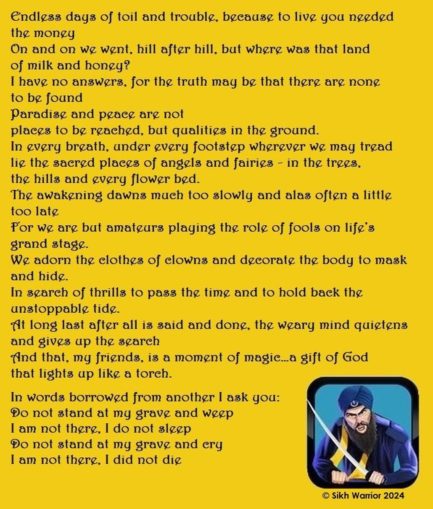
Since Sikhy believed, as do I, that this life is not all there is, I’ll finish with something that was written by Mitch Albom in his book ‘Tuesdays with Morrie’. He reminds us that “Death ends a life, not a relationship.”
I shall miss you my friend, and I daresay a good proportion of Puffins reading this will too so, until we meet again, I’d like to invite you to share your reminiscences of Gurmeet, our Sikhy, in the comments below. I would hope that seeing how much he was loved and respected may bring a little comfort and peace to his family at a time of great sadness.
